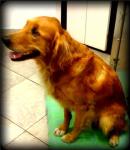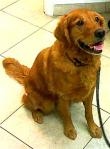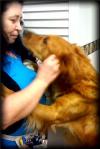Search and Rescue Golden Retrievers Save Lives in Haiti
“Doc, check ‘im out. We just got back from deployment in Haiti.”
Just making casual conversation while I gave Vegas his physical, “So, how was Haiti?”
“We found many, many people in the rubble. We were there for the 6.4 aftershocks. What’s weird is, nobody we met in Haiti trusted the dogs.
“They have these little short-haired white dogs with tails curled up over their backs, stand-uppy ears and pointy noses that look kinda like big Chihuahuas.
“They run as soon as they see people; they are not tame. So, when the people see a big red Golden Retriever, they can’t believe the dogs work with us.
“We’d be driving through a neighborhood with collapsed buildings everywhere and you could see if somebody was digging frantically versus someone looting. We’d go there with the dog to find out if the person they were digging for was alive. The dogs are trained to signal a live person, but they will not signal a deceased person.
“Well, sometimes the person was dead. But none of the people believed the dog could know that. They never heard of a dog working like that before. They would get angry and desperate when we had to tell them their loved one was passed and we were not going to dig them out because we had to move on to help rescue living people.
“We found a woman who had been trapped without food or water for 15 days. Then we worked for 17 hours to free another person.
“Some of the volunteer doctors had to come right out to the wreckage and help free people by performing surgical amputations right there in the field. There’s no follow-up healthcare, so some of the surgeries were more extreme than they would be in the US. Here, skin grafts, bandage changes, and advanced medical care are available.”
I had heard some of our fire department search and rescue teams travelled to Haiti to help rescue people. I wondered about the conditions in Haiti.
“Well, we stayed in tents on the lawn of the US Embassy. We had Haitian drivers who took us out in armored vehicles during the day to search for survivors. After we cleared the schools, hospitals, and hotels, they dropped us off in the regular neighborhoods. The drivers were surprised we didn’t carry guns. We didn’t run into any trouble. Maybe because everybody was scared of the dogs.”
Vegas, Stryker, and Sierra fared well. Only a few scratches. None of the buildings collapsed on them. Before anyone could stop him, Vegas jumped up on a 3 foot high wall with a 6 foot drop on the other side! He didn’t even hesitate in his search to find people alive!
Our service dogs and officers served humanity and represented America proudly. How many of us use the skills and talents we have to help others? Start today; you will be glad you did!
Doc Truli whole-heartedly, “Thank you so much to all the Search and Rescue teams risking their health and their own lives, sacrificing to save people and help Haiti recover from the earthquake.”
from → Canine Officers, Dogs, Golden Retriever, Pet Stories








This is so moving. Thank you for sharing this. It’s so interesting how dogs have such different roles in different cultures and countries.
One of my favorite books was a first-hand account of a woman who trains and partners SAR dogs. The stories were joyful and heartbreaking, and the amount of work and knowledge that goes into it is enormous! (Of course, now I can’t remember the author or title.)
I know that many of the SAR dogs who worked the World Trade Center disaster — along with the human rescue workers — later got sick from exposures to the chemical fumes and debris. Do you worry about that in your SAR patients? Are there things you can look for after a mission or in later months or years to check on the health of their noses, eyes, and respiratory systems that might be in addition to what you usually would do?
I certainly do look for unusual and uncommon diseases in the Search and Rescue -SAR- dogs. For example, our volunteer SAR team dogs returning from Hurricane Katrina ravaged New Orleans need chest x-rays and fungus blood tests. So far they are all fine. BTW- the search and rescue officers pay for this care themselves! (We discount it tremendously out of our own pocket to help. These are just ordinary working people with kids and families!) Even though there are FEMA and veterinary SAR exposure hazard guidelines, our dogs receive no budget to address the issues. Some of the officers also pay their own airfare to go volunteer in disaster areas! They pay for almost all of their airfare, hotels, and registration fees for training and certification exercises as well! This is a miracle (that these wonderful people dedicate their lives to help others) and a shame on the country that no one applies the political juice to treat these wonderful officers and their canine partners properly!
After Haiti, diseases such as Leptospirosis, which is endemic and common in water in Haiti, need special consideration. The US government provides veterinary technical support, advice, and checklists of diseases to watch for in rescue zones around the world.